On Reading
Deep reading and writing are revolutionary in a society where ignorance is on the march.
Deep reading and writing are revolutionary in a society where ignorance is on the march.
I’m pleased that for the second year in a row I’ve been invited to be the professional editor on hand and participating in the summer workshop for writers put on by the Adirondack Center for Writing, in Lake Placid, NY, coming up Saturday, June 11. I really enjoyed the conference last year, when I read and commented on the work of more than a dozen talented nonfiction and fiction writers. The format was an open one that seemed to benefit all the writers: in advance I read submissions from each writer, then on the day of the workshop I spoke in front of the whole group about the work of each writer presented to me. It proved to be a serious but not judgmental forum for all participating writers. If you live and work in upstate NY, and are interested in having me read your work as part of the workshop, you’ll find all the details at this link.
Here is a description of my session:
1:15-2:30pm How to Pitch Your Work with Philip Turner
You will be asked thousands of times, “what is your book about?” and “who is the reader for it?” You need to be able to answer these questions in a compelling way in sentence or two, though it is often hard to do this. Philip will lead a session on ways to answer these questions, and others publishing professionals may ask you. Participants will also be able to pitch their work this session and get feedback on it. This pitch will follow your project from the beginning stages all the way through marketing, so make sure it is a good one.
Also, see screenshot below of ACW’s web page with more information.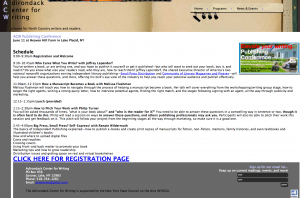
Paying affectionate homage to Mark Twain, who died on this date in 1910, in Redding, CT, one day after Halley’s Comet’s close approach to Earth, a celestial visitor that also neared Earth around his birth in 1835. Here’s a photo I took of his grave a few summers ago at the lovely cemetery where he’s buried in Elmira, NY.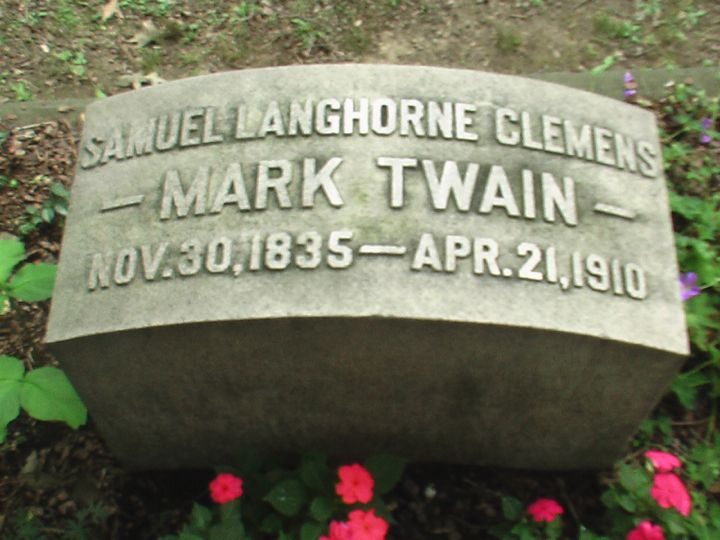
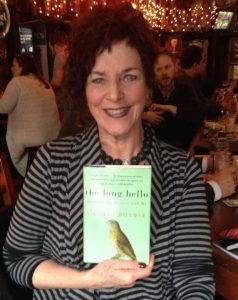 I’ve edited manuscripts for a number of author clients who at some point in the process have considered self-publishing as an option for placing their work in front of the public, though they sometimes hesitate over the uncertainty of whether a self-published book stands a chance to be discovered by readers and covered by members of the media. While not downplaying the challenges, I have been able to point out successes in fiction (not one of my authors, but Hugh Howey’s WOOL series is a notable one), but I’ve not been able to do the same for nonfiction. Now I’m glad to say that thanks to an introduction from bestselling author, music journalist, and CBC radio host Grant Lawrence alerting me to the publication story of Vancouver, BC author Cathie Borrie, I now have a nonfiction success to point to. The book is The Long Hello: Memory, My Mother, and Me, which Borrie (shown here) self-published in 2010 when a curator with the Museum of Modern Art in NYC asked her to participate in the museum’s lecture series on Alzheimer’s Disease. She’s since taken her book from a self-published title to commercial publication with Simon & Schuster Canada in 2015 (acquired by Toronto friend, editor and bookseller Martha Sharpe), and now with Arcade Books in the US (acquired by editor friend Cal Barksdale). As shown in the screenshot here of a Facebook event page, a theatrical-style reading will take place beginning at 6pm tonight at the Emily Harvey Gallery in NYC to launch the US edition.
I’ve edited manuscripts for a number of author clients who at some point in the process have considered self-publishing as an option for placing their work in front of the public, though they sometimes hesitate over the uncertainty of whether a self-published book stands a chance to be discovered by readers and covered by members of the media. While not downplaying the challenges, I have been able to point out successes in fiction (not one of my authors, but Hugh Howey’s WOOL series is a notable one), but I’ve not been able to do the same for nonfiction. Now I’m glad to say that thanks to an introduction from bestselling author, music journalist, and CBC radio host Grant Lawrence alerting me to the publication story of Vancouver, BC author Cathie Borrie, I now have a nonfiction success to point to. The book is The Long Hello: Memory, My Mother, and Me, which Borrie (shown here) self-published in 2010 when a curator with the Museum of Modern Art in NYC asked her to participate in the museum’s lecture series on Alzheimer’s Disease. She’s since taken her book from a self-published title to commercial publication with Simon & Schuster Canada in 2015 (acquired by Toronto friend, editor and bookseller Martha Sharpe), and now with Arcade Books in the US (acquired by editor friend Cal Barksdale). As shown in the screenshot here of a Facebook event page, a theatrical-style reading will take place beginning at 6pm tonight at the Emily Harvey Gallery in NYC to launch the US edition. 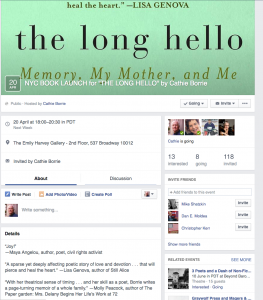
With Borrie in town this week, I met her for the first time, and heard about the background of her evocative and poetic book, which I’m currently reading and enjoying very much. As Borrie’s mom became more and more in thrall to dementia, Cathie realized that what she said, despite coming from a place of confusion, nonetheless had a definite kind of lucidity to it. She began taping their conversations, and then used them when assembling her manuscript, contributing to a kind of verbal collage of their final years together. The process also prompted her to revisit her childhood years, and the recesses of their family life. Instructive for any self-published nonfiction author, it’s also evident that over the years Borrie worked hard at getting her book into the hands of key influencers in the medical, home-care, and nursing worlds (it’s also notable that Borrie trained as a nurse and has a Master’s in Public Health). She also secured a one-word blurb from Maya Angelou, “Joy,” that any author would love to have on the cover of their book.
Now, David Henry Sterry of The Book Doctors, like me, a book editor and blogger, has conducted an excellent interview with Borrie, examining the journey she’s taken with her book. I suggest you read it, for the valuable insights that Borrie’s gained from the whole experience. A screenshot of it is below, and you may click on this link to read the whole Q&A. If you’re considering self-publishing as an option for your own work, I urge you to read The Long Hello and learn from Borrie’s experience in the evolving book market.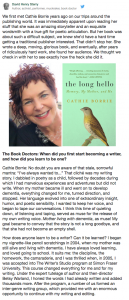
I'm tickled that Canadian music journalist, CBC broadcaster, author, friend—and devoted reader of adventure tales—Grant… Posted by Philip Turner on Wednesday, 23 March 2016
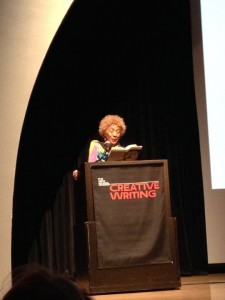 The National Book Critics Circle’s annual literary extravaganza began last night, a two-night affair I’ve attended every year since the early 2000s (and written about on this blog before). Last night 25 of the authors whose books are finalists for the awards in the six categories which will be given tonight read from their books. No admission charge for the readings or the awards tomorrow, NY’s best free literary program every year. There’s a post-awards benefit tomorrow night, the only part of the wordfest that carries a charge. I’ll be there again tonight. Glad I got good pictures in the darkened auditorium at The New School on West 12th St.
The National Book Critics Circle’s annual literary extravaganza began last night, a two-night affair I’ve attended every year since the early 2000s (and written about on this blog before). Last night 25 of the authors whose books are finalists for the awards in the six categories which will be given tonight read from their books. No admission charge for the readings or the awards tomorrow, NY’s best free literary program every year. There’s a post-awards benefit tomorrow night, the only part of the wordfest that carries a charge. I’ll be there again tonight. Glad I got good pictures in the darkened auditorium at The New School on West 12th St.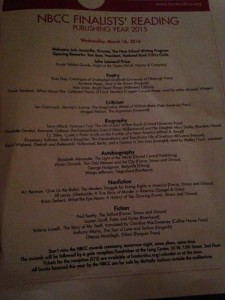
Engrossed halfway thru Pig Iron, novel in voice of north-of-England narrator JJ Wisdom, by @BenMyers1. #vernacular pic.twitter.com/dsrpqjaIOF
— Philip Turner (@philipsturner) February 1, 2016
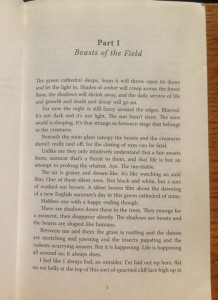 I was only rounding the halfway bend when I tweeted the above last weekend about Pig Iron, Benjamin Myers’ 2012 novel. The investment in the story that I expressed then paid double as I finished the book, progressively becoming more and more gripped by the fate of its narrator, John-John Wisdom, a young man whose hardscrabble history is steadily revealed to the reader through the course of a beautifully twined narrative that braids together parallel first person accounts by he and his mother. Through them we at last learn the whole truth of the Wisdom family.
I was only rounding the halfway bend when I tweeted the above last weekend about Pig Iron, Benjamin Myers’ 2012 novel. The investment in the story that I expressed then paid double as I finished the book, progressively becoming more and more gripped by the fate of its narrator, John-John Wisdom, a young man whose hardscrabble history is steadily revealed to the reader through the course of a beautifully twined narrative that braids together parallel first person accounts by he and his mother. Through them we at last learn the whole truth of the Wisdom family.
In the parlance of England, the Wisdoms are “Travellers,” perhaps not exactly ethnic Roma but wandering tribes nonetheless, reminiscent of Europe’s long-shunned gypsies. The inventiveness with language and vocabulary was reminiscent to me of what Russell Hoban did in Ridley Walker and Anthony Burgess in A Clockwork Orange, without the same futuristic-apocalyptic intimations as Hoban, but a violent strand like Burgess. Young Wisdom’s late father was a bare-knuckle boxer, while his son’s a fighter of a different kind. John-John, only recently released from a five-year prison sentence, is determined to put his life back together following a deed that he only hints at when a new girlfriend asks him about his time away from the rural climes he cherishes, his “green cathedral.” The references to a rural idyll reminded me of when a terminally ill Dennis Potter, creator of the magnificent “Singing Detective” TV series, expressed a deep connection for the Forest of Dean in his courageous 1994 interview with Melvyn Bragg. John-John Wisdom and Kurt Vonnegut’s Billy Pilgrim in “Slaughterhouse Five” seem like literary and spiritual cousins.
I also see Myers’ work in a line of connection with the contemporary English writer of landscape and wild places, Robert Macfarlane, whose The Old Ways: A Journey on Foot I loved so much. I read much of the latter aloud to my wife, as we both delighted in the sound of Macfarlane’s words and place names that evoke the chalk cliffs of England, the windy Hebrides, and desert Palestine. Myers’ work would also be great to hear voiced, with his rich vocabulary and kinetic vernacular. Hmm, makes me wonder if there are audio book editions of his work yet. 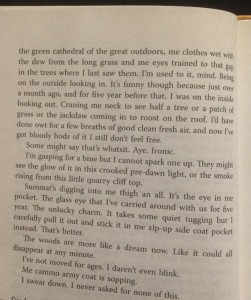
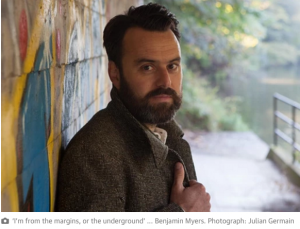 Myers is gaining recognition in the UK. His 2014 novel, Beastings, was awarded the Manchester, England public library’s Portico Prize, after Pig Iron had earlier won the Gordon Burn award, named in honor of a Newcastle, England novelist. I learned about Myers through this profile in the Guardian’s book pages by Alison Flood, then bought Pig Iron online from a UK bookseller. Its publisher is Bluemoose Books of West Yorkshire, England. This is Myers’ website. He hasn’t had much exposure yet in the US, and I hope this post of mine draws some attention to his work. He deserves to be read by fans of the writers mentioned above, as well as readers who enjoy Cormac McCarthy and Kent Haruf. I look forward to next reading Beastings, again set in a rural area, about an adolescent girl who’s a runaway from a coercive family she’d been indentured to work for.
Myers is gaining recognition in the UK. His 2014 novel, Beastings, was awarded the Manchester, England public library’s Portico Prize, after Pig Iron had earlier won the Gordon Burn award, named in honor of a Newcastle, England novelist. I learned about Myers through this profile in the Guardian’s book pages by Alison Flood, then bought Pig Iron online from a UK bookseller. Its publisher is Bluemoose Books of West Yorkshire, England. This is Myers’ website. He hasn’t had much exposure yet in the US, and I hope this post of mine draws some attention to his work. He deserves to be read by fans of the writers mentioned above, as well as readers who enjoy Cormac McCarthy and Kent Haruf. I look forward to next reading Beastings, again set in a rural area, about an adolescent girl who’s a runaway from a coercive family she’d been indentured to work for.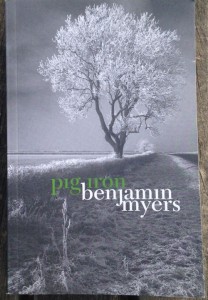
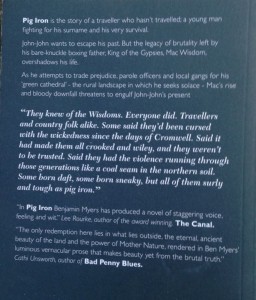
 Wow, this is going to be a blockbuster book. Jane Mayer’s latest, due out Jan 19th, is Dark Money: The Hidden History of the Billionaires Behind the Rise of the Radical Right. It’s the subject of a NY Times news article tonight by Nicholas Confessore who must’ve gotten an early copy. He reports on the collective portrait of rightwing billionaire families, including Richard Mellon Scaife, who before his death in 2014 spent more than a billion dollars of his Mellon family fortune pushing conservative causes; most notably, in the 1990s he harassed Bill Clinton through the infamous American Spectator magazine (see “Troopergate” if you need a reminder). I recall of this with firsthand memory because in the early 2000s I edited and published Susan MacDougal’s memoir of the years she was pursued by Whitewater Special Prosecutor Kenneth Starr, The Woman Who Wouldn’t Talk: Why I Wouldn’t Testify the Clintons and What I Learned in Jail., whose probe was an outgrowth of Scaife’s bankrolling Whitewater into a faux scandal. After discussing Scaife, the book examines an earlier brother pair, Lynde and Harry Bradley; and the DeVos family of Michigan. Apparently, Mayer then moves on to the bulk of her book, the Koch family. Confessore releases this explosive finding from Mayer’s investigation:
Wow, this is going to be a blockbuster book. Jane Mayer’s latest, due out Jan 19th, is Dark Money: The Hidden History of the Billionaires Behind the Rise of the Radical Right. It’s the subject of a NY Times news article tonight by Nicholas Confessore who must’ve gotten an early copy. He reports on the collective portrait of rightwing billionaire families, including Richard Mellon Scaife, who before his death in 2014 spent more than a billion dollars of his Mellon family fortune pushing conservative causes; most notably, in the 1990s he harassed Bill Clinton through the infamous American Spectator magazine (see “Troopergate” if you need a reminder). I recall of this with firsthand memory because in the early 2000s I edited and published Susan MacDougal’s memoir of the years she was pursued by Whitewater Special Prosecutor Kenneth Starr, The Woman Who Wouldn’t Talk: Why I Wouldn’t Testify the Clintons and What I Learned in Jail., whose probe was an outgrowth of Scaife’s bankrolling Whitewater into a faux scandal. After discussing Scaife, the book examines an earlier brother pair, Lynde and Harry Bradley; and the DeVos family of Michigan. Apparently, Mayer then moves on to the bulk of her book, the Koch family. Confessore releases this explosive finding from Mayer’s investigation:
 As editor, I also acquired IBM and the Holocaust: The Strategic Alliance Between Nazi Germany and America’s Most Powerful Corporation (2001, Crown Publishing) by Edwin Black, and on this website blogged several times about The Collaboration: Hollywood’s Pact with Hitler by Ben Urwand. I have an eye for these sort of titles, and I’m sure this one by Mayer will be fascinating, and important.
As editor, I also acquired IBM and the Holocaust: The Strategic Alliance Between Nazi Germany and America’s Most Powerful Corporation (2001, Crown Publishing) by Edwin Black, and on this website blogged several times about The Collaboration: Hollywood’s Pact with Hitler by Ben Urwand. I have an eye for these sort of titles, and I’m sure this one by Mayer will be fascinating, and important.
